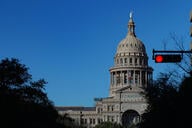You have /5 articles left.
Sign up for a free account or log in.
When the past academic year began, I warned that professors have ceded ground to a growing and powerful class of student-facing administrators who not only shape considerable academic discourse at colleges and universities but also are dangerous to the promotion of deliberative dialogue. Those administrators -- in offices such as student life and residential education -- are overwhelmingly liberal and have fostered the creation of a progressive and activist monoculture among students on many campuses with their extracurricular agenda-setting power.
Now that the academic year has come to a close, my warning appears to have rung true as a week would hardly go by without protests over institutional policies, activist demands to force curricular and faculty changes, regular threats and incidents of violence, and the disinviting of speakers. While some colleges and universities like Johns Hopkins University took a stand against activism run amok, many -- such as Harvard University and my own, Sarah Lawrence College -- have capitulated more to student demands and ignorant mob rule.
So the question now is what can be done to improve the chances of having students in higher education genuinely embrace viewpoint diversity and debate ideas? My answer is quite simple: faculty members need to reassert themselves as the ones who direct discourse on college and university campuses both inside and outside the classroom. The bloated administrative bureaucracy must be checked.
Put simply, let the faculty -- not the students or administrators -- run the institution. This includes professors being the ones who have input in extracurricular programming from student orientation curricula to residential education initiatives where hard humanistic questions are tackled. It also means that faculty members who have expertise in particular subject matter or professional fields should mentor and advise students and not leave that to entirely to administrative advising offices like career services, which may not have the expertise and industry connections.
Professors should have control over what they teach and how they teach it. Faculty members are trained to be thoughtful and balanced, and their professional judgment should not be subject to regular outside or administrative review by those who are not academically trained to make such decisions. Thus, the recent rise of policing and reviewing of course content by nonspecialists such as diversity offices, despite the positive intentions of supporting students, must stop. Faculty members are well aware of the need to promote diversity and should be trusted to develop and bring balance to their own courses.
My rationale for advising faculty members to re-emerge as leaders on campus is this: it is the professors who spend their careers explicitly striving to establish facts, wrestle with the multiplicity of ideas and search for truth. Most administrators are not trained to teach complex questions and effectively mediate the nuance and context that is the hallmark of a real humanistic education. Rather, they are givers of care and supervision that has helped develop narrow and particular progressive worldviews.
I recently conducted two, approximately 1,000-person, nationally representative surveys of both faculty members and student-facing administrators and asked both groups about student educational plans and curriculum. In the surveys, I questioned the faculty members and administrators about how much control students should have over their own educational paths once they set foot on a campus. And I found the divergence of views between faculty members and administrators to be staggering.
When prompted with the statement “Most undergraduates are mature enough to be given responsibility for their own education,” 74 percent of the administrators agreed that most undergraduates have the maturity to plan their own education. Only 47 percent of faculty members, however, thought that undergraduates should direct their own educational program.
Breaking down the numbers a bit further, I discovered no differences for administrators by college type. But as many as 80 percent of administrators in my sample who are part of the top 25 colleges and universities, as rated by U.S. News & World Report, believed that students are responsible for their own education, compared to a notably lower 66 percent when the rankings dropped below the 100 mark. Regional differences emerged, too, with those more liberal regions in New England and the West coast being about 10 points more supportive than that the more conservative areas in the plains and the Southwest. And, of course, there were ideological differences: just 59 percent of the few conservative administrators believed the students should be responsible, compared to about 75 percent of those who are moderate and liberal.
That being said, administrators across the board voiced substantial support for allowing students to shape their own educational experience. And that raises a question: Why should students attend college if so many are already able to direct their own educational paths?
Faculty members responded very differently. Only 45 percent of liberals and conservatives maintained that students are mature enough to manage their own educational paths. Moreover, regional differences were minor. Some variations emerged among those in different types of institutions, with faculty who work in private liberal arts colleges being more supportive of students selecting their own paths by about 12 points, compared to those in both private and public universities. That fits the general ideological mission of liberal arts colleges compared to larger university settings.
As a professor, I believe that a liberal arts and sciences education should be difficult. Students need to engage with questions and subjects that are not easy. They should be exposed to a multitude of viewpoints and tools that will help them tackle questions about life in general. They should have input in shaping their educational paths, but professors exist to help open up their worlds and force them to confront topics that they either would like to avoid or about which they are ignorant. The results of my survey, however, reinforce the idea that such views are appreciably different from the mission and views that most administrators hold dear.
Indeed, the data make it unambiguously clear that my views on the educational paths of students, while conforming to those of other faculty members, are at significant odds with the ones that the administrative class generally holds. To be sure, by allowing administrators to set so much of the tone and coordinate so many educational experiences, we in the faculty have been derelict of duty and our obligation to teach the skills to our students that promote tolerance and rational discourse and debate.
Those of us who value viewpoint diversity must re-engage with our students before they are coddled into thinking that they already know the ways of the world and how to learn. It is time for us professors to make our voices heard. Otherwise, the collegiate chaos over the past few years is likely to continue, to the detriment of both higher education and the nation at large when our students enter the real world.




